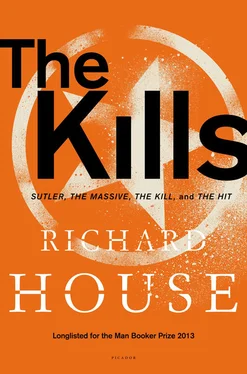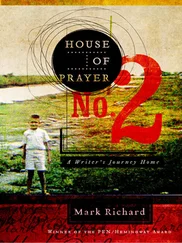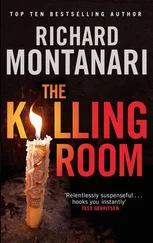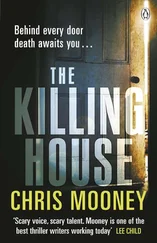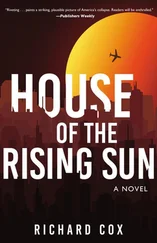‘That’s better for them, but not so good for you.’ Nathalie led him back to a stall beside the barber shop. If he wanted Turkish lire he could change money at one of the banks, although it would be expensive it might be sensible. ‘Not everyone will take American money.’ She laughed. ‘You remind me — when I was a child I was very forgetful, and my parents adored me, they spoiled me and replaced everything I lost with something new or better so I could become even more careless. I never had anything old. I had the idea that one person was collecting my things. Not stealing them but keeping them for me somewhere. This was my excuse. Just imagine all the things you’ve lost, everything you’ve mislaid, collected in one room, like at a train station. Safe, all in one place.’
Ford glanced into the barber shop as they passed. The men now talked with ease. He asked if she was serious about the room, the lost property, and she said this was a long time ago. ‘I have to admit that I am forgetful now. I have no excuse. I lose things all the time.’
They walked casually from stall to stall. ‘Tell me. What do you need?’
‘Everything,’ he replied. ‘A hat. Shirts. Trousers. New clothes for a new man.’
‘Really, everything? Sandals?’
‘Everything.’
Ford looked over the stall but couldn’t see anything he would choose.
‘Is there anywhere I can get online here? The internet?’
Nathalie shook her head. ‘You must use your phone, or go to Birsim. You can ask in one of the hotels.’ She checked her watch. Martin would arrive soon from Ankara and she should return to the Maison du Rève.
Ford found a hat and inspected himself in a hand mirror. Clean-shaven and with shorter hair his face now appeared angular, crisp. Nathalie held up two shirts. ‘Light,’ she said, ‘but not white.’ She spoke in French to the trader then gave Ford a wave. ‘You know, I was mistaken about the time. I really should go.’
Ford watched her walk away without hurry. A languid, self-conscious walk. Other men noticed and turned her way as she passed.
3.2
Parson’s day began with mixed news. Another message from the London office asking that he contact Gibson: urgent business.
‘It’s about the Hassan case,’ Gibson began, ‘the translator who broke his neck in that lorry accident.’
Parson had no trouble recalling the desert road. The tyre marks heading straight. The highway curving west. ‘Amer Hassan. What haven’t I done?’
‘It’s your recommendation. HOSCO aren’t happy. You asked them to settle.’
‘And what did they come back with?’
‘No compensation. Final pay only. They are prepared to round up to the whole month.’
‘But what about the family? There was no life insurance.’
‘They’re simply following your findings, you marked the claim “no culpability”.’
‘With mitigating circumstances, which is why I recommend that they settle. There’s more to consider here. It’s all in my notes.’
‘Well, they’ve seen your report, and they aren’t having any of it.’
‘He has a family. He has two children. Their father is dead. They’ve just arrived in England. His wife doesn’t speak English, and she’s now without a husband. They live in Darlington, for christsakes.’
‘You marked “no culpability”. You know how these things go. If the family aren’t happy they can contest the claim.’
‘With what money? I thought we were supposed to protect them from claims like this. If the family take this to the papers the story won’t be good for HOSCO.’
‘It’s unlikely. I think they’ve calculated the risks. We’re talking about immigrants who don’t speak English. HOSCO have made their decision.’
‘Remind me why we do business with them?’ Parson turned away from the table and sat forward. Realizing that he had embarrassed Gibson, he apologized. About him men in uniform and desert fatigues returned to tables with trays, voices from the kitchen rang sharp and hollow through the commissary. He disliked the smell of fried food, which seemed to thicken and add heat to the air, stick to the floors and tables: fat that reeked of sick.
‘I do have one piece of good news.’ Gibson passed on to new business. ‘Two journalists have spotted Stephen Sutler. And he’s in Turkey.’
* * *
The journalists insisted on meeting Parson at their motel in Cukurca.
It sat at the intersection of two main roads at the edge of town — one branch east — west, the other aimed north. Without doubt Sutler would have passed this junction, it was the one certain fact Parson knew about him, and if he was attentive he would have seen the motel stuck in the crotch of two roads, surrounded by a shantytown of wind-slapped tents. He would have seen this place.
The meeting struck him as a waste of time. The moment Heida answered the door she became sharp with demands, and he guessed that they had been arguing. Grüner, antsy, bothered, and indifferent, appeared to be sulking. Parson understood that the offer of information came with a condition of some kind, some subterranean demand as yet unexpressed, which threw doubt on anything she might tell him. Heida, edging toward the subject, asked if she could tape the interview. Parson ignored the request and when she set the digital recorder on the table he immediately switched it off.
They all looked at the device.
Grüner complained about the motel. ‘The people outside,’ he said, ‘are different from the people at Kopeckale. It’s not so safe. There is only the manager here.’
Parson also felt this tension: this crowd, with fewer women, fewer children, kept separate from the motel by a chain-link fence, had attitude and palpable threat. ‘Anyway,’ Grüner shook his head, ‘I don’t see why he would come here?’
‘Why not?’ Heida disagreed. ‘It makes perfect sense. He can pass across the border with the refugees, it’s not so hard for him to disappear here. People can come this way without trouble.’
‘You saw him in Kopeckale.’ Parson drew out a map. ‘Stephen Sutler.’
Heida said that they needed to talk first. She looked at Grüner while she spoke to Parson. ‘It’s simple. We need permits to enter Iraq.’
‘I don’t know anything about visas.’
‘They won’t recognize our status. We have proper identification. They are stopping the press from entering the country by requiring working visas. It’s crazy. We have a right. A duty. It is impossible to work until we are there.’
Parson didn’t understand. There were journalists in Iraq assigned to military units, journalists working with bureaus; every branch of media, every company had people placed in Iraq. ‘I don’t know anything about this. It’s not my area. I don’t see what I can do.’
‘But you want this man? Yes? You want this person? Yes? Everybody wants to find him. So maybe if you want him you could do something for us? You could help? They won’t let us through because the borders are closed. If we want to go to Iraq we have to fly to Frankfurt or Düsseldorf, or maybe Beirut, I don’t know, and then we fly to Baghdad, to the American zone, and then, finally, after this, we drive all the way back to the border just to be thirty kilometres away from where we are now. It’s crazy. It doesn’t make sense.’
Uninterested in repeating himself Parson waited. Heida persisted. Behind her, mounted in a single line, a series of four photographs of small stone churches in deep and lush valleys.
‘The people you work for are American? Yes? You work for the same people we called? So maybe if you call these people, speak with the people who sent you, they will do something if they want to know about this man?’
Читать дальше
